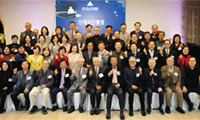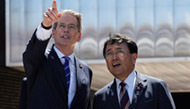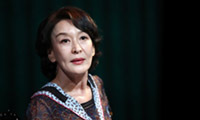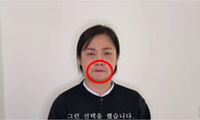But when Zheng Yuantao, a 30-year-old translator, came upon the novel in 2005, he set out to bring this tale to the Chinese readership .
“My goal was to translate a positive gay love story for Chinese people to see as a role model,” he said.
Two years after he first approached a Chinese publisher, Horizon Media, he celebrated his success at the book’s introductory party this past August.
Mr. Zheng’s triumph marks a stunning shift in Chinese society as the country’s economic development has brought new liberalization and ideas to its shores. While film, radio and television remain under the thumb of the Chinese government, the book industry has become more open.
Although certain subjects like the Dalai Lama, Taiwan independence and overtly religious themes remain verboten, the hunger for literature, business advice and selfhelp books has fueled a scramble among Chinese publishers and their international counterparts to translate classics and best sellers into Chinese.
According to official figures, more than 15,700 foreign titles were bought by Chinese publishers in 2008 . In 2005, fewer than 10,000 such titles were bought.
Wang Ling, Horizon’s chief literature editor, cites as a turning point for her company its publishing of “The Da Vinci Code” in 2003, of which two million copies have been printed here, followed by the huge success of “The Kite Runner,” with 800,000 in print - astronomical numbers in a country where, Ms. Wang says, only “super-best sellers” reach half a million copies.
Horizon often turns to Li Jihong, a 30-year-old from Shanghai translated “The Kite Runner.”
Sometimes, an authentic translation runs afoul of the Chinese government. In “The Kite Runner,” references to the Soviets’ meddling in Afghanistan were removed, as it was deemed to tarnish the Communist brand. Mr. Li loved the “Conversations With God” series so much that he bought the Chinese rights. The first book stayed on the Amazon China top-100 best-seller list for a year . These are books, he said, that “awaken the conscience of the powerful and bring consolation to the powerless.”
The Big Apple, a Chinese literary agency that represents publishers from around the world, said it sealed more than 2,000 contracts in 2009 and expected that number to increase in 2010.
Big Apple and other agencies also make sure publishers’ intellectual property does not fall into the wrong hands in China, which has a notorious record for ignoring copyright laws.
However, the legal environment in China has improved, said Wendy King, vice president of Big Apple. “Following the copyright laws is now the norm .”
Western publishers are opening offices in Beijing and Shanghai. HarperCollins says the number of its deals and the revenue from those sales have more than doubled in the last three years. Donald Trump’s “Think Big in Business and Life” was one of the most successful titles.
That books like “The Persian Boy” and “The Da Vinci Code” caused some jitters over their controversial themes yet were published and then became popular, says Ms. Wang, reveals a government growing more at ease with foreign ideas .
By DAN LEVIN
스마터리빙
more [ 건강]
[ 건강]이제 혈관 건강도 챙기자!
[현대해운]우리 눈에 보이지 않기 때문에 혈관 건강을 챙기는 것은 결코 쉽지 않은데요. 여러분은 혈관 건강을 유지하기 위해 어떤 노력을 하시나요?
 [ 건강]
[ 건강]내 몸이 건강해지는 과일궁합
 [ 라이프]
[ 라이프]벌레야 물럿거라! 천연 해충제 만들기
 [ 건강]
[ 건강]혈압 낮추는데 좋은 식품
[현대해운]혈관 건강은 주로 노화가 진행되면서 지켜야 할 문제라고 인식되어 왔습니다. 최근 생활 패턴과 식생활의 변화로 혈관의 노화 진행이 빨라지고
사람·사람들
more
[송년행사 화보] “이웃과 함께 나누고 지인과 함께하니 행복”
KYCC13일 윌튼 플레이스 초등학교에서 열린 ‘한인타운청소년회관(KYCC) 홀리데이 카니발’이 성황리에 막을 내렸다. 올해는 KYCC 창립 …

[송년행사 화보] “ ‘손에 손잡고’ 한 해 마무리… 건강과 행복 기원”
전주고·북중남가주 전주고·북중 총동창회(회장 백규종)의 2025년 정기총회 및 송년회가 지난 14일 LA 작가의 집에서 성황리에 열렸다. 이날…
[송년행사 화보] “한 해를 마무리하며… 화기애애…
LA 러너스클럽LA 러너스클럽(회장 김두병)은 13일 작가의 집에서 80여명의 회원과 가족이 참석한 가운데 송년회를 마쳤다. 2007년 창립된…
[송년행사 화보] “웃음과 감사 가득 ‘훈훈’… …
한국학교총연합회미주한국학교총연합회(회장 이영숙)가 주최한 제43회 장기 근속교사 포상 및 송년의 밤 행사가 140여명의 교사들이 참석한 가운데…
[송년행사 화보] “친구야 반갑다… 선배님들 모두…
경남중고경남중·고등학교 남가주 동창회(회장 예해덕)는 지난 6일 송년회를 열고 동문 및 가족 60여 명이 참석한 가운데 끈끈한 우정을 확인했다…
많이 본 기사
- ‘AI 인프라구축 속도전’ 위한 인허가 개편 법안, 하원 통과
- 트럼프, 대마초 규제 완화…헤로인과 같은 1급서 3급으로 하향
- 경찰, ‘통일교 금품수수 의혹’ 전재… 1
- 美·英 10대소년 유가족, 메타 상대 소송… “미성년 성착취 방치”
- 독이 된 박나래 영상..문장 끝 꾹 닫힌 입까지 분석 “리스크 관리 최대”
- 트럼프 “차기 연준 의장 몇주내 발표…3∼4명과 얘기 중”
- 방미 위성락 “진전있었다…정상합의 후속조치 서두르기로”
- 워싱턴DC 대표 공연장 케네디센터 명칭 ‘트럼프-케네디센터’로
- 위기의 트럼프 “내년봄 최대규모 세금… 1
- 에어 프레미아 취항, 기대 컸나
- 보건부, 미성년자 성전환 의료 차단 추진… “자금지원 중단”
- 2026년형 기아 쏘렌토, 2025 IIHS충돌 평가 최고 등급(TOP SAFETY PICK+) 획득
- 기아 텔루라이드, 뉴스위크 선정 ‘2026년 가장 기대되는 신차’ 리스트 등재
- 노스캐롤라이나주 공항서 商用항공기 추락… “7명 사망”
- 67명 숨진 워싱턴 여객기·軍헬기 충돌에 정부 ‘책임 인정’
- 한국연극배우협회 “윤석화 별세 사실 아냐”…보도자료 정정·사과
- 11월 소비자물가 2.7%↑ 선방했지만… “자료부족해 구멍숭숭”
- ‘주한미군 일방감축 견제’ 부활한 2026년도 美국방수권법 발효
- 尹, 계엄군 장성들에 “미안”…계엄엔… 1
- LA 소파이 스테디엄 8경기 확정
- ‘라도♥’ 에이핑크 윤보미, 손편지로 결혼 발표..9년 열애 결실 “함께하기로”
- 어느덧 20주년.. ‘5남매 가족’ 이동국♥이수진, 세월 잊은 비주얼
- ‘브라운대 총기참사’ 뉴욕 한인학생도 총상
- LA산불 여파 ‘심각’ 지역 주민 건강악화
- ‘무려 94.2%’ 안세영 새 역사 썼다, 역대 단일 시즌 ‘女 최고 승률’
- 변정수, 갑상선암→성대결절 고백 “거의 죽음을 경험했다”
- 트럼프, 사이버안보 총괄 NSA국장에 조슈아 러드 지명
- 워싱턴 일원 소비 확 줄어들었다
- “보이스피싱 이렇게 당한다”
- 브라운대 한인학생, 총격참사 극적 생존
- “김혜성만큼은 받지 않을까” 송성문 포스팅 D-3, ML 스카우트도 낙관했다
- 미일, ‘日 5천500억 달러 대미… 1
- 韓국방부 “美와 핵잠수함 연료공급 협상 2년 내 완료 목표”
- “금리 대폭인하 신봉자”…트럼프가 곧 낙점할 연준 차기의장 누구
- “판공비 1만달러 전액 반환하겠다” 3
- “왜 한국 자산 미국으로 옮겨야 하나… 1
- 美, ‘네타냐후 체포영장·조사’ 국제형사재판소 판사 제재
- 내년 봄 새 앨범→대규모 월드투어..방탄소년단, 완전체 컴백 앞두고 글로벌 음악시장 ‘놀라운 영향력’
- 백악관, ‘인플레둔화’ 지표에 반색… “바이든 위기와 극명 대비”
- “북VA 주택시장 가격 급등 없다”
- 크리스마스 연휴 겨울폭풍 남가주 연안 2~4인치 비
- 뱅크오브호프, 규모도 1위·봉사활동도 ‘으뜸’
- 경찰, 통일교 자금줄 쥔 한학자 前비서실장 13시간 조사
- 하원, ‘트럼프 베네수엘라 군사작전 저지 결의’ 무산
- 중고차 주행거리 조작 ‘주의보’
- 월드컵 방문객 ‘미국행’… 한국선 ESTA(전자 여행 허가서)로 입국 가능
- 엡스타인 ‘공범’ 옛 연인 “공정한 재판 못받았다” 석방요구 청원
- 거래 더디지만 균형 회복… 리얼터닷컴 내년 주택시장 전망
- 구글-메타, 엔비디아 독주 막으려 ‘오월동주’…AI칩 SW개발 협력
- [윌셔에서] 잠시 멈추어 서서
1/5지식톡

-
 ☝️해외에서도 가능한 한국어 선생님…
0
☝️해외에서도 가능한 한국어 선생님…
0이 영상 하나면 충분합니다!♥️상담신청문의♥️☝️ 문의 폭주로 '선착순 상담'만 진행합니다.☎️ : 02-6213-9094✨카카오톡ID : @GOODEDU77 (@골뱅이 꼭 붙여주셔야합니다…
-
 테슬라 자동차 시트커버 장착
0
테슬라 자동차 시트커버 장착
0테슬라 시트커버, 사놓고 아직 못 씌우셨죠?장착이 생각보다 쉽지 않습니다.20년 경력 전문가에게 맡기세요 — 깔끔하고 딱 맞게 장착해드립니다!장착비용:앞좌석: $40뒷좌석: $60앞·뒷좌석 …
-
 식당용 부탄가스
0
식당용 부탄가스
0식당용 부탄가스 홀세일 합니다 로스앤젤레스 다운타운 픽업 가능 안녕 하세요?강아지 & 고양이 모든 애완동물 / 반려동물 식품 & 모든 애완동물/반려동물 관련 제품들 전문적으로 홀세일/취급하는 회사 입니다 100% …
-
 ACSL 국제 컴퓨터 과학 대회, …
0
ACSL 국제 컴퓨터 과학 대회, …
0웹사이트 : www.eduspot.co.kr 카카오톡 상담하기 : https://pf.kakao.com/_BEQWxb블로그 : https://blog.naver.com/eduspotmain안녕하세요, 에듀스팟입니다…
-
 바디프렌드 안마의자 창고 리퍼브 세…
0
바디프렌드 안마의자 창고 리퍼브 세…
0거의 새제품급 리퍼브 안마의자 대방출 한다고 합니다!8월 23일(토)…24일(일) 단 이틀!특가 판매가Famille: $500 ~ $1,000Falcon: $1,500 ~ $2,500픽업 & 배송직접 픽업 가능LA…
케이타운 1번가
오피니언
 수잔 최 한미가정상담소 이사장 가정법 전문 변호사
수잔 최 한미가정상담소 이사장 가정법 전문 변호사 [수잔 최 변호사의 LIFE &] AI 시대 편리함에 안주하지 말자
 김도년 성균관대 건축학과 교수 스마트도시·건축학회장
김도년 성균관대 건축학과 교수 스마트도시·건축학회장 [로터리] 지멘스가 만드는 미래 동네

[여명] 금붕어를 키우는 오지선다형 수능
 허경옥 수필가
허경옥 수필가 [윌셔에서] 잠시 멈추어 서서
 양홍주 / 한국일보 논설위원
양홍주 / 한국일보 논설위원[지평선] 판다 없는 일본

[왈가 왈부] 쿠팡 김범석 “글로벌 CEO라 불출석”… ‘맹탕’ 청문회 불보듯
 정숙희 논설위원
정숙희 논설위원칠레에서 영국까지, 27년을 걷다
 마크 A. 시쎈 / 워싱턴포스트 칼럼니스트
마크 A. 시쎈 / 워싱턴포스트 칼럼니스트 [마크 A. 시쎈 칼럼] MAGA와 ‘힘에 바탕한 외교정책’
 김동찬 시민참여센터 대표
김동찬 시민참여센터 대표 [미국은 지금] 위기의 시대, 사회안전망은 최후의 방어선이다
1/3지사별 뉴스

‘브라운대 총기참사’ 뉴욕 한인학생도 총상
▶총상 입은 상황서도 동료학생 의식 잃지않도록 도와 ▶부친도 동문 “우리 가족에게 고통스러운 일”지난 13일 발생한 브라운대학교 총기난사(본보…
뉴욕주 안락사 합법화 초읽기 호쿨, “안전장치 마련되면 서명”

워싱턴 일원 소비 확 줄어들었다
올해 8월 워싱턴DC에 범죄와의 전쟁을 명분으로 주방위군이 본격적으로 배치된 가운데, 이 시기 이후부터 버지니아와 메릴랜드, DC 등 워싱턴 …
“북VA 주택시장 가격 급등 없다”

베이지역 스포츠팀, SF 한인회에 후원금
샌프란시스코 베이지역 한인회(회장 김한일)는 한인 메이저리거 이정후 선수의 소속팀인 샌프란시스코 자이언츠(San Francisco Giants…
불자커뮤니티 20일 청소년발표회및 송년회

오늘 하루 이 창 열지 않음 닫기 



















































.png)


댓글 안에 당신의 성숙함도 담아 주세요.
'오늘의 한마디'는 기사에 대하여 자신의 생각을 말하고 남의 생각을 들으며 서로 다양한 의견을 나누는 공간입니다. 그러나 간혹 불건전한 내용을 올리시는 분들이 계셔서 건전한 인터넷문화 정착을 위해 아래와 같은 운영원칙을 적용합니다.
자체 모니터링을 통해 아래에 해당하는 내용이 포함된 댓글이 발견되면 예고없이 삭제 조치를 하겠습니다.
불건전한 댓글을 올리거나, 이름에 비속어 및 상대방의 불쾌감을 주는 단어를 사용, 유명인 또는 특정 일반인을 사칭하는 경우 이용에 대한 차단 제재를 받을 수 있습니다. 차단될 경우, 일주일간 댓글을 달수 없게 됩니다.
명예훼손, 개인정보 유출, 욕설 등 법률에 위반되는 댓글은 관계 법령에 의거 민형사상 처벌을 받을 수 있으니 이용에 주의를 부탁드립니다.
Close
x